

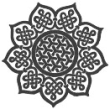
The Claim that Qur'an 33:53
Commands Women to Wear Niqab (Face Veil)
The following is the verse used to convince women they must conceal their faces outside / wear niqab:
يَا أَيُّهَا الَّذِينَ آمَنُوا لا تَدْخُلُوا بُيُوتَ النَّبِيِّ إِلا أَنْ يُؤْذَنَ لَكُمْ إِلَى طَعَامٍ غَيْرَ نَاظِرِينَ إِنَاهُ وَلَكِنْ إِذَا دُعِيتُمْ فَادْخُلُوا فَإِذَا طَعِمْتُمْ فَانْتَشِرُوا وَلا مُسْتَأْنِسِينَ لِحَدِيثٍ إِنَّ ذَلِكُمْ كَانَ يُؤْذِي النَّبِيَّ فَيَسْتَحْيِي مِنْكُمْ وَاللَّهُ لا يَسْتَحْيِي مِنَ الْحَقِّ وَإِذَا سَأَلْتُمُوهُنَّ مَتَاعًا فَاسْأَلُوهُنَّ مِنْ وَرَاءِ حِجَابٍ ذَلِكُمْ أَطْهَرُ لِقُلُوبِكُمْ وَقُلُوبِهِنَّ وَمَا كَانَ لَكُمْ أَنْ تُؤْذُوا رَسُولَ اللَّهِ وَلا أَنْ تَنْكِحُوا أَزْوَاجَهُ مِنْ بَعْدِهِ أَبَدًا إِنَّ ذَلِكُمْ كَانَ عِنْدَ اللَّهِ عَظِيمًا
"You who Believe, do not enter the prophet's apartments for a meal unless you are given permission to do so; do not linger until [a meal] is ready. When you are invited, go in; then, when you have taken your meal, leave. Do not stay on and talk, for that would offend the prophet, though he would shrink from asking you to leave. Allah does not shrink from the truth. When you ask his wives for something, do so from behind a barrier: that is purer for your hearts and theirs. It is not right for you to offend Allah's messenger, just as you should never marry his wives after him: that would be grievous in Allah's eyes. Allah has full knowledge of all things, whether you reveal them or not." (Qur'an 33:53-54)
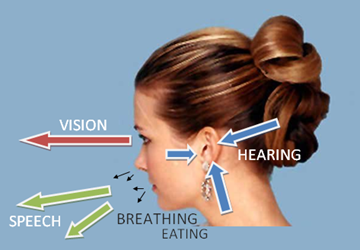
Inputs and outputs concentrated on the human head.
The eyes, nose, mouth and ears all require an exposed environment to work as designed, which is why Allah has concentrated them all on the head. This is why the head is 'designed' to be exposed and not covered. The functions are identical on both men and women, therefore women too require the head to always be free of obstruction - the intended blueprint of Allah's master-plan.
The deduction that is commonly made from the aforementioned verse is that the prophet's wives must cover their faces. It is followed further on, saying, since they are examples for ordinary believing women, all believing women must also cover their faces / wear niqab.
It is necessary to establish some very obvious points about the verse which a person listening to those who wish to spread niqab fail to see. Where exactly does it tell the prophet's wives to cover their faces?
1) In the above verse, no where is a face veil mentioned - it says - "When you (i.e. the believing men) ask his wives for something, do so from behind a barrier".
2) The verse is addressing the believing men, and not the prophet's wives i.e. "You who believe..." (given the context it is addressing men).
Therefore, it orders believing men to ask them (prophet's wives) from behind a barrier.
How did this transpire to imply a niqab for prophet's wives? Assuming for argument's sake it is a face veil as they say, then who is to wear it?! Since the verse reads "When you (i.e. the believing men) ask his wives for something, do so from behind a barrier" addressing the believing men, therefore, it is the men who should wear niqab! It is not addressing the wives of the prophet!
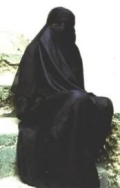
Treacher Collins Syndrome
This is a genetic disorder that affects muscles and bones in the face. 1 in 10,000 people are born with this abnormality (with varying degrees of severity), as a sign unto mankind to make them realise their ungratefulness towards Allah, who fashioned human beings in a form they can behold.

Julianna Wetmore after several reconstructive surgeries.
If you were born like this, how would you feel? You would feel the need to hide away your face from the world, and prayed to Allah to give you a face you would not be forced to hide. But without you having to suffer from this experience, He has fashioned you in a pleasing way. How should you respond instead, now that Allah has, in His infinite bounty, answered your prayer without you praying for it, created you with a well-designed face. It is gross ungratefulness to Allah to propagate to believing women that they are still dysfunctional to reveal what would otherwise not have been possible if Allah truly wanted to make it dysfunctional.
The Word for 'barrier': Hijab / حِجَابٍ
One can see that great leaps are made when they say it is commanding the prophet's wives to wear niqab. Because in addition to the above argument that it is asking believing men to speak to prophet's wives from behind a barrier, the word used as barrier ( حِجَابٍ / "hijab") is not a face veil, nor is it the common hijab that people have come to use it as (head scarf). In the Qur'an, this word is never used in the context of women's dress but used only in its meaning as a 'barrier'. For example:
"When you recite the Qur'an, we place an invisible barrier (حِجَابٍ / "hijab") between you and those who do not believe in the life to come. We have put covers on their hearts that prevents them from understanding it, and heaviness in their ears." (Qur'an 17:45-46)
"It is not fitting for a man that Allah should speak to him except by inspiration, or from behind a barrier (حِجَابٍ / "hijab"), or by sending a messenger to reveal with His permission, whatever He wills: for He is Most High, Most Wise." (Qur'an 42:51)
Therefore, the word does not accommodate clothing. Two main points have been covered so far regarding the verse. First one is that it is in reference to believing men, and secondly, it is not to do with clothing.
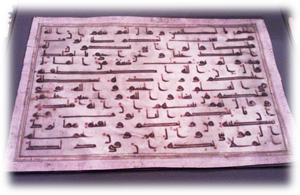
A General Rule for Interpretation
It is argued that one must look at other sources and how the companions of the time of the prophet understood the verse. Thus, sources of hadith books are resorted to. However, whatever extra-Quranic sources an individual wishes to look at to derive an interpretation of any given verse, the root understanding has to be there in the verse, even if the interpretation varies - the basis has to be there. What is being said here is that there must be something in the verse that can be correlated to mean what the person is claiming from his extra-Quranic sources. For instance, If someone claims there is a hadith for a certain verse giving some explanation, it cannot insert an idea in the verse when nothing is remotely suggested in the verse of that nature! Because this would not be an interpretation of the Qur'an, rather an interpolation. When it becomes an interpolation, it meets the criteria of those being addressed in the following verse: "Woe to those who write the Book with their own hands then Say: "This is from Allah!", so that they can make a cheap gain! Woe to them for what their hands have written, and woe to them for what they gained." (Qur'an 2:79).
A piece of writing may have three possible interpretations, interpretation A, interpretation B and interpretation C. All three could be different yet could be valid - but a fourth one that provides no evidence from the excerpt, cannot even be called an interpretation, and such a claim cannot be valid. For example, if an extra-Quranic text says person 'x' from the time of the prophet did this after the revelation of this verse, while that action of the person is not in the verse, it cannot be claimed that the verse commands that action of the person. If this claim is taken to be valid and then furthermore, treated as part of the excerpt - that would be an indirect writing of the Scripture and verse 2:79 would be applicable.
A Quranic verse may have more than one interpretation, but not one which does not root itself in the content of the verse. The derivation that Quran's verse 33:53 commands the wives of the prophet to conceal their faces or wear niqab is one such claim using an extra-Quranic source - the root link is missing and such a source should not be accepted. The Qur'an does not command prophet's wives to cover their faces no matter what another body of text says.
Ordinary Believing Women are different to Wives of the Prophet
Just for argument's sake, suppose their claim was indeed rooted in the Qur'an, and the Qur'an was using the word for face veil, and was also telling the prophet's wives to speak behind that face veil, there would still be a missing link to state that this rule is applicable to all ordinary believing women.
This is because the Qur'an says. "Oh wives of the prophet, you are not like any other women." (33:32) and lays different rulings for them to ordinary women. For example, the punishment for adultery and the prohibition to re-marry.
However, this is just a hypothetical situation, since neither does the Qur'an use the word for face veil, nor address the wives of the prophet (rather, the believing men).
A Psychological Barrier: An Interesting Interpretation
The word used in Verse 33:53 is "hijab / حِجَاب" to mean 'barrier'. Elsewhere in the Qur'an, the word has been similarly used, but not to mean a physical barrier.
Following on from this understanding, the wives of the prophet have been described as 'mothers of the believers' in the Qur'an (33:6). Could this mean that, Allah is calling believing men to put up a psychological barrier between themselves and the prophet's wives - and view them as they would their own mothers, instead of ordinary believing women with whom re-marriage is eligible?
"Mention in the Book the story of Mary. She withdrew from her family to a place in the east and took a barrier ("hijab / حِجَاب") from them." (Qur'an 19:17)
"When you recite the Qur'an, We place an invisible barrier ("hijab / حِجَاب"), between you and those who do not believe in the Hereafter." (Qur'an 17:45)
And he said, "Truly do I love the love of good, with a view to the glory of my Lord,"- until (the sun) was hidden in the barrier ("hijab / حِجَاب") [of night]. (Qur'an 38:32)
All these verses indicate an invisible barrier. And the following verse is an example of the word being explicitly used by ordinary people of Arabia to mean psychological barrier at the time of the prophet:
"And they say: Our hearts are protected from what you call us to, and in our ears there is a deafness, and between us and you there is a barrier ("hijab / حِجَاب"). So do what you wish, and we will do what we wish." (Qur'an 41:5)
Therefore, it is possible that Allah is calling believing men to put up a psychological barrier between themselves and the prophet's wives - and view them as they would their own mothers, rather than as ordinary believing women with whom marriage is eligible (i.e. to not develop a liking with the intention of marriage * ). After all, with a mother, a man is most close to in a unique way, and speaks face to face and a physical barrier is not rational.
* Marriage to prophet's wives after his dismissal is forbidden unlike to ordinary widowed women (33:53).
"The prophet is closer to the believers than their own selves, and his wives are their mothers." (Qur'an 33:6)
Conclusion
Believers must be careful not to insert something that is not there in the actual verses of the Qur'an. Doing so would be a grievous sin and has been rebuked in many places in the Qur'an:
"Among them is a group who distort the Book with their tongues so that you think it is from the Book when it is not from the Book. They say, 'it is from Allah', but it is not from Allah. They tell a lie against Allah and they know it." (Qur'an 3:78)
Those people who publish books and writings on the Qur'an altering its core meanings with extra-Quranic sources must also be aware of Allah:
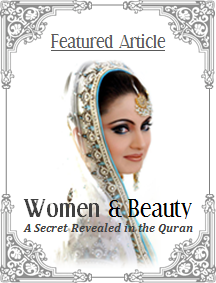
"Woe to those who write the Book with their own hands then Say: "This is from Allah!", so that they can make a cheap gain! Woe to them for what their hands have written, and woe to them for what they gained." (Qur'an 2:79)
Verse 33:53 of the Glorious Qur'an, does not command the prophet's wives to wear niqab, nor the ordinary believing women. Face veil / niqab does not feature in verse 33:53 at all. Furthermore, it is actually addressing the believing men, not the wives of the prophet.
There is no teaching in the Qur'an for any women of the world to cover their faces when outside. The human head is a miraculous act of creation and a distinctly different part of the human body - and has been designed by Allah on both men and women with the expectation that it remains exposed at all times. See Hijab & Niqab in the Qur'an.
The Woman who lost her Face
In May 2005, Isabelle Dinoire from France was attacked by her pet Labrador who gnawed away her face when she fell unconscious. She woke up in a pool of blood. The damage to her face was so extensive that doctors ruled out routine face reconstruction and suggested a face transplant instead. Her nose, lips and chin were completely torn away.

With such horrific injuries, Isabelle hid from the world. She describes her experience prior to her surgery in the following words:
"First time I went out [wearing face mask], in some ways, I was happy to go out. But in other ways, I was frightened to leave the hospital. At the start, I cried every time I went out. Some people don't say anything out of the ordinary. They say, 'hello', they talk. Other people look and shrink back. In the shops, some people even hide out of the way. No body could tell how long its going to take [to find a face donor]. I need to walk around the hospital. When I hear the Firemen and the Ambulences, each time I think its going to be someone who is going to die. And may be I could have a face. Its a hard thing to say."
Isabelle would do anything to have her old intact face back, which Allah had created for her to walk outside with a pleasant look. She now has an appreciation of the purpose of her original face which she can never get back. Allah's bounty on all means He did not give such a test upon you, but used her as a means for those who seek wisdom. Those who are wise are able to place themselves in the shoes of someone else and learn from the wisdom they might gain without having to go through the same experience. The face you have is designed to cover the hideous underwork just beneath it. For one to say that you must cover the face designed by Allah, without which you would have to hide from the world is an indication of a lack of appreciation of Allah and a lack of true wisdom.
"Have we not made for him two eyes? A tongue and two lips? And we showed the way to two paths. Yet, he has not embarked upon the steep path. What will explain to you what the steep path is? It is to free a slave. To feed people in days of shortage. To bring the orphans near as well as the very poor. Only then he would become one of the believers, who exhorts people to the truth and to kindness. These are the companions of the right". (Qur'an 90:8-15)
Continue Reading:
See also:
|
Collection of 4:34 Translations which do not use "beat/scourge/hit" (violence) |
|
|
Understanding the Arabic Language does not Mean One Understands the Qur'an |

Copyright © , QuranicPath. All Rights Reserved.

